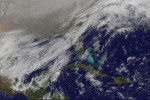 4 Terms
4 TermsHome > Industry/Domain > Chemistry; Weather > Atmospheric chemistry
Atmospheric chemistry
A scientific study of the chemistry of the Earth's atmosphere and that of other planets.
Contributors in Atmospheric chemistry
Atmospheric chemistry
UV-A
Chemistry; Atmospheric chemistry
Ultraviolet light that has wavelengths of 320 nm to 400 nm. The wavelengths of this light are shorter than visible light and are not absorbed in the stratosphere by ozone.
atmospheric window
Chemistry; Atmospheric chemistry
This is a gap in the atmosphere's spectral absorption. It is created because not enough molecules in the atmosphere are absorb in the wavelengths 8-12 micrometers. Absorption is caused by the ...
radical termination
Chemistry; Atmospheric chemistry
Two or more radical species reacting to form non-radical products; the nighttime reaction of nitrogen dioxide radical with ozone to produce neutral nitrogen pentoxide is an example of radical ...
acid rain
Weather; Atmospheric chemistry
Acid rain is a rain or any other form of precipitation that is unusually acidic, meaning that it possesses elevated levels of hydrogen ions (low pH).

Polar Vortex
Weather; Atmospheric chemistry
The polar vortex is a winter phenomenon. It develops and strengthens in its respective hemispheres' winters as the sun sets over the polar region and temperatures cool. They weaken in the summer. In ...
Sea Surface Temperature (SST)
Weather; Atmospheric chemistry
This is the temperature of water near the surface of the ocean. The accurate meaning of surface varies based on the measurement procedure used, but it is between one millimeter (0.04 in) and twenty ...
volcanic lightning
Weather; Atmospheric chemistry
Also known as 'dirty lightning', these are lightning formed within the plume of a volcanic eruption; usually occurs when the volcanic eruption produces too much positive ions and those ions end up ...


